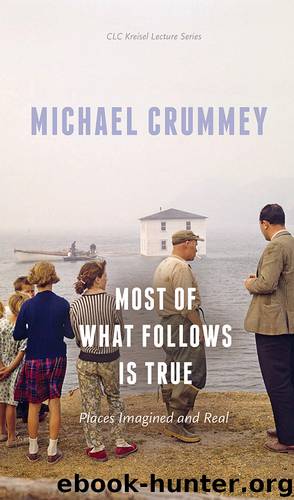Most of What Follows is True by Michael Crummey

Author:Michael Crummey [Michael Crummey]
Language: eng
Format: epub
ISBN: 9781772124637
Publisher: The University of Alberta Press
BUT WHAT DOES IT MATTER, you may be asking? So what if he gets the details wrong? Does it hurt anything that naive readers will come away from this book believing residents of Witless Bay at the turn of the 20th century were quasi-bohemian, sea bass–eating, coffee-swilling, scone aficionados who spent their abundant leisure time applauding lobsters at the local fine-dining establishment? Am I being ridiculous to feel so disheartened by the book, to feel alternately infuriated and demoralized by it?
Norman isn’t writing history, not even “historical fiction” in the way that, say, Wayne Johnston is in The Colony of Unrequited Dreams. The New York Times review of The Bird Artist refers to it as a “fable,” claiming it’s “whimsical details” lend it a “fairy-tale quality.”19 It suggests we aren’t meant to take any of this as a literal reflection of the world. And it may be that I am in the wrong here, that I am faulting The Bird Artist for failing to be something its author never intended.
But it is impossible for me, and I think for anyone with even the vaguest sense of the realities of life in Newfoundland, not to feel insulted by the book’s cavalier use of the place for its own ends. I know from my parents’ stories what people endured simply to keep body and soul together in those communities. And it’s exasperating to see their world appropriated by someone with so little regard for the most basic truths of those lives. Norman might as easily (and more honestly) have set the book in New England or Nova Scotia in the 1950s. What was the motivation for setting the story in this particular place if the particulars of the place are completely irrelevant and dispensable?
Annie Proulx’s The Shipping News received decidedly mixed reactions in Newfoundland, partly owing to the fact that she, like Howard Norman, was a come-from-away, an outsider taking it upon herself to present Newfoundland to the world. Inevitably, she came under fire for her misapplication of language in the Dictionary of Newfoundland English that is no longer in use, or her tone-deaf attempt to copy the unique qualities of Newfoundland place names with her own versions (Killick-Claw and Omaloor Bay and Flour Sack Cove sound to local ears like Codco satire).
But the main gripe people had with Proulx’s novel was its emphasis on—detractors would say gross exaggeration of—sordid elements of the culture, particularly that of sexual abuse and incest. It was written at a time when the Mount Cashel sex abuse scandal was at its height, which undoubtedly fuelled Proulx’s interest. But many Newfoundlanders didn’t take kindly to a book that suggests sexual perversion is a ubiquitous feature of the place. The local Killick-Claw newspaper, The Gammy Bird, has a weekly column devoted to the latest outrages. Here’s the columnist, Nutbeem, running down the list for an upcoming issue:
“More priests connected with the orphanage. It’s up to nineteen awaiting trial now. Here’s a doctor at the No Name Medical Clinic
Download
This site does not store any files on its server. We only index and link to content provided by other sites. Please contact the content providers to delete copyright contents if any and email us, we'll remove relevant links or contents immediately.
| Diaries & Journals | Essays |
| Letters | Speeches |
The Rules Do Not Apply by Ariel Levy(4969)
Bluets by Maggie Nelson(4556)
Too Much and Not the Mood by Durga Chew-Bose(4348)
Pre-Suasion: A Revolutionary Way to Influence and Persuade by Robert Cialdini(4232)
The Motorcycle Diaries by Ernesto Che Guevara(4098)
Walking by Henry David Thoreau(3962)
Schaum's Quick Guide to Writing Great Short Stories by Margaret Lucke(3381)
The Daily Stoic by Holiday Ryan & Hanselman Stephen(3319)
What If This Were Enough? by Heather Havrilesky(3311)
The Day I Stopped Drinking Milk by Sudha Murty(3197)
The Social Psychology of Inequality by Unknown(3030)
Why I Write by George Orwell(2952)
Letters From a Stoic by Seneca(2798)
A Short History of Nearly Everything by Bryson Bill(2698)
A Burst of Light by Audre Lorde(2607)
Insomniac City by Bill Hayes(2558)
Feel Free by Zadie Smith(2479)
Upstream by Mary Oliver(2390)
Miami by Joan Didion(2368)
